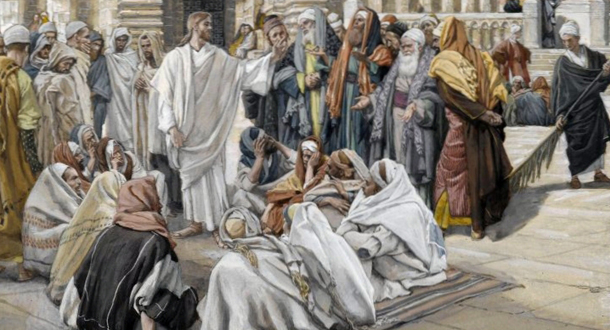
Scripture:
Reflection:
As we journey through this Lenten season, the daily Scriptures increasingly reveal the growing conflict that will ultimately lead to Jesus’ crucifixion.
Today’s Gospel highlights deep divisions in the group of people who surround Jesus from its opening verses to its final line. First, we hear how the crowd is split. Some declare Jesus to be a prophet, while others insist, he is more than a prophet, calling him the Christ. Following this, disputes arise over his origins. John sums up that section with these words, “So a division occurred in the crowd because of him.”
The division extends beyond the crowd. The Pharisees clash with the guards, who are hesitant to arrest Jesus. Even among the Pharisees themselves, there is conflict and division. Some are quick to condemn Jesus without even following their law. Others caution against judgment without following the law.
The final line is brazenly symbolic of this division; “Then each went to his own house.” It is a striking image of separation. In a sense, John has mapped out a picture of how diabolical divisions can be. The divisions John has named have torn the fabric of their community.
Remember, this passage comes from the Gospel of John, nicknamed by some the Gospel of Belief. Throughout John’s Gospel, we see a sharp contrast between believers and unbelievers. Every sign, every encounter is an encouragement leading people to believe. Layered through this whole gospel is the great division of believers and non-believers. Scripture scholars remind us of how this reflects the troubles that existed within the post-resurrection Johannine community.
Listening to John’s Gospel, the author creates a duality between believers and unbelievers much like the “us” and “them” language of today’s reality. Do you see the numerous parallels between John’s divided community and our modern divided world? A significant difference is how John’s divisions were centered on religion, not politics.
In today’s divided world, we have become overly cautious about everything we say, knowing that it will inevitably be viewed through a political lens. Almost everything is interpreted as a political statement. Sadly, we have lost the ability to see actions and motivations through other equally valid perspectives, such as economics and religion. So, when people ask me to help sift through it all, I merely say we have to be true to our discipleship. Jesus was pretty simple. He told us to love people and care about people.
Using the lenses of politics to pollute Jesus’ instructions is sinful. It doesn’t get more basic than Matthew 25: When I was hungry you gave me food. When I was thirsty, you gave me drink… To summarize, when I was a person in need, you helped me. And Jesus sums it up by saying, “Whatever you do to the least of my brothers and sisters, you do to me.” These simple and basic words continue to challenge us two thousand years later.
Fr. David Colhour, C.P., is the Provincial Superior of Holy Cross Province. He resides in Chicago, Illinois.
